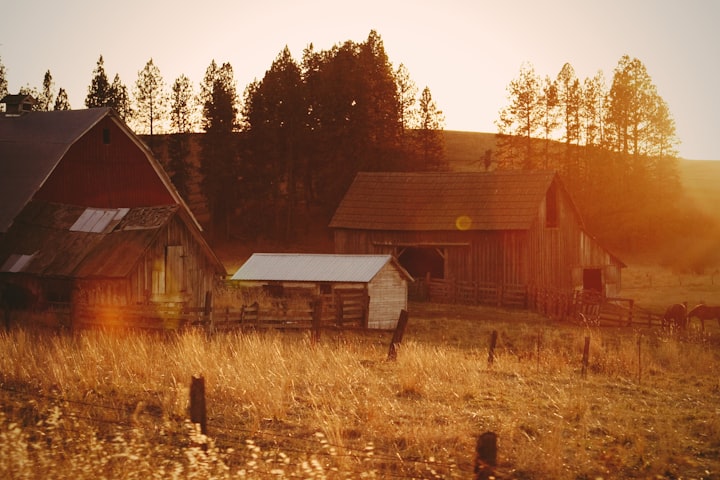
Somewhere in the middle of nowhere stands an old barn- long past its usefulness but still handsome in its own unassuming way. A timid morning sun shows its first signs of arrival over its roof and highlights the blank sky with traces of gold. The stars have nearly disappeared, ready to retire, another night’s work nearly complete. This is the place where the evening meets the daylight, conversing with one another without any expectation. Soon it will be full dawn, but for now, the world sleeps soundly beneath a blanket that the two skies have woven together.
There is a house there, too. It stands beside its barn brother, comfortable with its simplicity. It is a house of retrospection and secrets. Family gatherings, holidays, births, deaths, shadows of the past burned and buried within its brick walls. It is a house that belongs to no one. Rather, it grants permission to share its warmth for a while before making an imprint in its memory.
Fletcher Nello waits patiently at his post on the front porch. He drinks strong, bitter coffee now, swallowing it in gulps. He smokes as he leans against the aging rail. And he breathes. Chilly morning air fills his aching chest; cloudy blue smoke escapes back to the atmosphere. In and out. In and out. Fletcher memorizes the rhythm; it is the only sound on Earth now.
The stillness is suffocating. Fletcher stands perfectly still with it, wondering if today will be the day that the quiet world around him will swallow him whole, let him disappear into the horizon and blend into the brilliant colors that have begun to creep across the sky. He has only known this place a short time, yet it has become a part of him. Perhaps it is his only link between reality and oblivion. He is free here. He is free from the strain of the city, of the commanding life that he left behind, of every responsibility. It's funny how nothing matters here.
Fletcher has no family, only strangers with faces that resemble his own. He thought he knew them once, in another lifetime perhaps, but his memory ebbs away with each passing day. He has no definition of home. He has only the moments as they escape with each passing breath; he has the warmth of the sun as it kisses his cheeks each morning and the companionship of the stars as they watch over him each night. And at this moment the two skies have come together to reunite with him and remind him that he is still mortal. He has today, but he cannot be promised tomorrow.
Soon Elisabeth will be awake, and Fletcher’s time will no longer belong to him. The day will become a blur of color and smell, of pills and bottles and books and ink. Then it is a shared life; two souls that have overlapped and joined forces in a balance that once was perfect. Once so delicate yet so equal, when invisible lines were drawn and respected, give and take silently understood, words unnecessary. The balance has shifted like an unseen storm stirring through their peaceful estate and knocking the walls to the ground. But Elisabeth continues on in a daze, side-stepping the rubble, the cradle that will never be occupied, the unwelcome phantoms of bottles and rattles with a sad smile. At first, Fletcher wanted so badly to reach out and pull her back, but now his energy has worn down to nothing, and he has lost his way to her.
Elisabeth cries in her room most nights. Fletcher hears her as he lies awake, overcome by the waves of pain that seem to swallow him up only in the dead of night. And he does nothing. Perhaps he shuts his mind off. Then he can forget her mournful sobs when they echo through his mind. But he will not go to her. He knows everything already. He can read her mind without trying; he memorized the map of her heart long ago. He remains hidden in the depths of his own sanctuary, listening and aware. It is not his fault. He did not choose this; thus he is not responsible for it.
At first, he didn’t want Elisabeth here. He had not asked her to come. She arrived in a flurry of white-blonde hair and linen, carrying suitcases full of womanly nonsense and fretting terribly about the house’s seclusion. The first few days of her arrival became nothing more than a series of scenes jumbled together as she bustled around the house until it became hers as well. She brought teas from far-off places, cooked food with impossibly named spices, filled the house with flowery scents. She rid the cabinets of anything canned or boxed, cleared the refrigerator of beer and wine. She did this because she loved him, as she had always loved him, and he understood that. She loved him with no expectation, not needing to be loved in return because she knew that he could not give that to her. Nor did he want to.
On days like these, Fletcher remembers how it was to wake up next to her. As he watches the morning sun paint the very tops of the distant trees, he is reminded of the rise and fall of Elisabeth’s breasts as she slumbered. He remembers her lovely eyes fluttering gently against the pillow. How her pale, perfect hand subconsciously sought his own beneath the soft cocoon of blankets. How her slender fingers laced through his. How he can never remember being cold while she was next to him. It was an unspoken love, a secret they mutually understood and never voiced. Perhaps he should have told her then what he now knows. He should have told her that his intentions never wandered past love in its simplest form. He regrets that he never took the time to uncover her deepest mysteries. Only now, in the wake of finality, does he understand how badly she wanted to be discovered.
The stars have disappeared completely now, having taken their final bows and turned the world over to the morning. The newly reborn sun senses Fletcher’s weaknesses and holds on meekly to the sky. A new battle has emerged; the fight between the solitary sun and the battalion of ominous clouds commences with silent fury. Watching the sky intently through disenchanted eyes, Fletcher can feel Elisabeth in the kitchen. Without looking, he can see her lithe body sleepily wander through the disarray, rummaging through pots and pans, nibbling at bits of wheat toast, playing the early morning role of the domesticated woman.
Fletcher says his silent goodbye to the outside world and crosses the threshold to reality. The kitchen is bathed in cool blues and blanketed with grays, the chromes unpolished, the cherry table undisturbed. Elisabeth has painted herself into the picture almost too perfectly; her white satin body blending into the smooth patio glass on which she is leaning. She sips her coffee, light and sweet, from a chipped ceramic mug bearing the picture of a tree. Fletcher wonders where such a mug originated from and how it found its way into their lives. Elisabeth stands very still against the glass, and from her reflection Fletcher can read the lines on her face. It takes a moment to realize that he was responsible for putting them there.
She catches sight of him in the glass and smiles without turning. It is a smile that brings with it all of her hopes and fears for him in a perfectly wrapped package. The smile spills truth that her otherwise cloudy eyes cannot…or will not. It is a smile only reserved for him. Her smile is her confession, and he is the only clergyman who can absolve it.
Elisabeth turns her gaze again to the world outside, still lost somewhere in that special place between sleep and awake. She rubs her midsection absently. A memory of pain floods through Fletcher, a pain unlike that which he has become accustomed to lately. Distant, ghostly shards of hurt whisper softly to his heart. A memory of a bright September Sunday, back in the days when he was a whole man, and her eyes were like crystal. Her words had stuck to his skin and melted through, sending an amazingly unexpected sense or peace through his body and reaching the hidden depths of his nature. He knew somehow that the child would have had his dark hair and her high cheekbones. His mouth. Her nose. His eyes. But it would not have her smile; her smile belonged only to him.
It is too much for Fletcher Nello to bear.
He slips away silently for the sanctuary of the living room, although Elisabeth prefers to call it a sitting room. Her definitions of “living” and “dead” are not as clear as his own. The room welcomes him. It knows what he is thinking, and it invites him to share his secrets. He settles into the old rocking chair and watches the door expectantly. She will walk through within a matter of seconds, ghostly in her silence, to hand him a blanket. Then she will leave again, humbly as she appeared, returning to the mysteries of womanhood for a while. He will count the hours in the day by the pills that she will bring him, pills that at the beginning were presented to him on tiny silver platters.
A Holy Communion of the damned.
Pills that are now stashed inside their bottles, waiting to be washed away with the red label whisky he keeps in his golden flask. She does not stay long enough to watch him, and it is better this way. It will not be real for Elisabeth this way.
Later he will walk with her to the barn. He will fill his senses with familiarity, bathe himself in the scent of his brethren of pine and oak, burn the images to his memory and hold them close; wanting nothing and expecting even less. He will watch Elisabeth as she plucks wildflowers and places them delicately in her hair.
But now, as he rocks back and forth, feeling the rhythm all around him, he imagines holding the child in his arms, breathing in its scent, feeling the patter of its tiny heart. Its lovely eyes would flutter against the pillow of his chest; its tiny, perfect fingers would subconsciously seek out his hand and lace through his own fingers. He knows this as he knows the morning sky, as he knows the evening stars, as he knows every part of this child’s mother.
Elisabeth floats into the room now, bringing with her the morning air. Hers is a face too lovely to be cursed with such a disconsolate expression. There should be happiness behind those eyes; celebration and hope inside that gaze. Instead, there is disease. There is tragedy. There is a lifetime of regret. Or perhaps he simply sees his own reflection upon her face. She was sent by the evening stars to take his place. Perhaps in her, all of his secrets will become truth. But as she sits delicately beside him now, he understands that there are no words left between them.
They watch the window methodically until the early afternoon sky succumbs to black clouds and the march of the gallant rain begins against the pane. Elisabeth says nothing as her lovely fingers find their way around his. In another lifetime, Fletcher would have been afraid of the storm. But today he has become the eye of it. It is here-today-after the walk, the pills, the red label that Fletcher will join the stars. He will sit like this, Elisabeth by his side, and grow dark with the world. He will become the evening sky. He will at last hold the child with his eyes and her nose. He will take his final breath. But at this moment, he is home. Here in the time of plenty.






Comments
There are no comments for this story
Be the first to respond and start the conversation.